The Central Steering Committee guides some contents on the work of preventing and combating negativity.
Instruction No. 25-HD/BCĐTW clarifies a number of contents on the work of preventing and combating negativity according to Regulation No. 32-QD/TW dated September 16, 2021 of the Politburo on functions, tasks, powers, working regime...
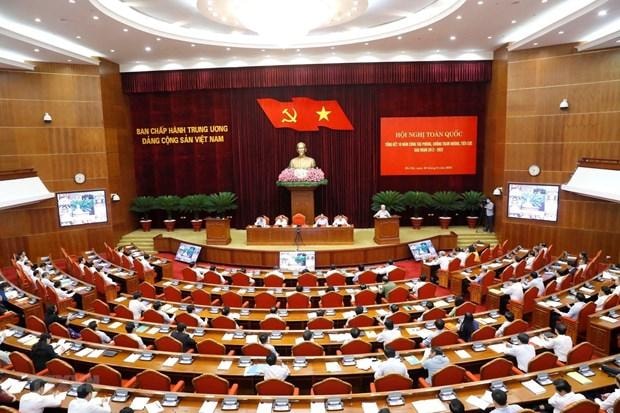 |
Panorama of the National Conference summarizing 10 years of work in the fight against corruption and negativity. Photo: Phuong Hoa/VNA |
The Central Steering Committee on Anti-Corruption and Negativity (Central Steering Committee) has issued Instruction No. 25-HD/BCĐTW on a number of contents on anti-corruption work.
Instruction No. 25-HD/BCĐTW clarifies a number of contents on the work of preventing and combating negativity according to Regulation No. 32-QD/TW dated September 16, 2021 of the Politburo on functions, tasks, powers, working regime, and working relations of the Central Steering Committee.
Accordingly, the subjects of prevention and combat of negativity are agencies, organizations, cadres, party members, civil servants, public employees, first of all, leaders and managers at all levels in the political system.
The content of directing the work of preventing and combating negativity includes promulgating and advising on the promulgation of policies, laws, and solutions to prevent and combat negativity; directing the synchronous implementation of the work of fighting and combating negativity associated with preventing and combating corruption, preventing, repelling, and strictly handling cadres, party members, civil servants, and public employees who have degraded in political ideology, ethics, and lifestyle.
Direct the building and improvement of institutions on preventing and combating negativity associated with building and rectifying the Party, the political system, and socio-economic management; clarify the causes and conditions for the emergence of negativity, loopholes and inadequacies in mechanisms, policies and laws to recommend and request competent agencies to prevent, overcome and improve.
Directing, urging, inspecting, and supervising the implementation of the Party's policies, guidelines, and regulations, and the State's laws on preventing and combating negativity. In particular, focusing on inspecting and supervising Party committees, Party organizations, leaders, and cadres holding leadership and management positions in areas, locations, and work positions that are prone to negativity and of public concern.
Directing the improvement of the effectiveness of detecting and handling negative acts through inspection, supervision, auditing, and handling of complaints and denunciations; strictly and synchronously handling Party discipline with State discipline, organization discipline, and criminal handling of violating cadres, Party members, civil servants, and public employees.
Directing the strict handling of negative cases and incidents, especially serious and complicated negative cases and incidents that are of public concern. Directing information, propaganda and education work to raise awareness and responsibility for cadres, party members, civil servants and public employees in preventing and combating negativity; orienting the provision of information on preventing and combating negativity; strictly handling acts of taking advantage of preventing and combating negativity to profit, harm good people, distort and sabotage the Party, the State and the regime.
Directing the work of summarizing and summarizing practices, researching theories on preventing and combating negativity; researching and evaluating newly emerging negative behaviors of cadres, party members, civil servants and public employees to advise and propose the Central Steering Committee to consider and include them in the list of focused prevention and combat. Directing the coordination work between functional agencies in preventing and combating negativity and in resolving serious, complicated negative cases and incidents that are of public concern.
The guidelines have clearly stated 19 negative behaviors that need to be focused on preventing and combating, including:
1. Speaking, writing, implementing incorrectly or not implementing, or not fully implementing the Party's policies, guidelines, regulations, and State laws.
2. Not complying with or not fully complying with the Party's organizational and operational principles, especially the principles of democratic centralism, self-criticism and criticism; being in agreement, being respectful, avoiding, afraid of conflicts, being silent, not fighting or supporting wrong and distorted opinions and viewpoints; covering up and concealing violations and shortcomings of oneself, others or the organization; not defending what is right, not fighting what is wrong; being arbitrary, authoritarian, lacking democracy, formal democracy, not respecting collective opinions; not complying with the organization's assignment, being picky about job titles and positions;...
3. Failure to perform or incomplete performance of exemplary responsibilities as prescribed by the Party.
4. Taking advantage of work related to state secrets, work secrets, and work under the authority to make personal gain. Providing, revealing, losing, or writing articles, posting secret information and documents of the Party, the State, or matters not yet permitted to be published; storing, disseminating, or inciting others to store or disseminate information and documents contrary to the Party's policies, guidelines, and regulations, and the State's laws; slandering, fabricating content related to corruption and negative cases or incidents, or arbitrarily assigning crimes and sentences before the court makes a decision; attacking, slandering, or insulting organizations and individuals, inciting violence, or dividing the great national unity bloc.
5. “Term thinking”, opportunism, profiteering, especially the act of abusing power, using the name of the collective to impose and legitimize wrong decisions of individuals; individualism, putting personal interests above the interests of the collective; pursuing immediate, short-term goals to reap benefits for oneself, family, and interest groups while ignoring the long-term goals and interests of the collective, community, and country; colluding with businesses and other entities for personal gain.
6. Bureaucratic, out of touch with reality, not closely following work, not having a firm grasp of the situation in the agency, organization, locality, or unit.
7. Presiding over the issuance or advising on the issuance of documents with contents contrary to the Party's policies, guidelines, and regulations, the State's laws, or having many loopholes that can be exploited to cause damage to the State, organizations, and individuals; "group interests," "term thinking" in policy and law making.
8. Lack of responsibility, lax leadership and management leading to disunity, corruption and negativity; failure to report, reflect and handle corrupt and negative acts in agencies, units and localities under one's direct management.
9. Improperly or incompletely implementing Party regulations and State laws in investment management, construction, banking, healthcare, insurance, bidding, auctions, securities, corporate bonds, equitization, use of houses, land, resources, minerals, finance, assets of the Party and the State, etc. Not practicing thrift, leading to loss and waste in management and use of public finance and assets. Purchasing, managing, and using public assets, assets of organizations, businesses, and individuals who contribute or sponsor in violation of regulations.
10. Giving or receiving gifts in any form to influence organizations or responsible people to make decisions that benefit oneself, family, or individuals, organizations, agencies, or businesses.
11. Taking advantage of the policy of encouraging and protecting dynamic and creative cadres for the common good to commit or cover up corrupt and negative acts. Disclosing information, threatening, retaliating against, and suppressing those who reflect, denounce, denounce, inform, or provide information about corrupt and negative acts.
12. Having acts of seeking positions, seeking power, covering up, assisting, intervening, influencing organizations and individuals so that they or others can be accepted, recruited, planned, rotated, transferred, appointed, nominated, run for election, rewarded, disciplined, awarded titles, sent to school, sent abroad, or have their cadre regimes and policies implemented contrary to regulations.
13. Interfering, influencing or allowing family members, relatives or acquaintances to take advantage of one's position or job title for personal gain. Causing difficulties, harassment, extortion, or prolonging the time for people and businesses to process work.
14. Interfering with or influencing the activities of inspection, supervision, investigation, auditing, investigation, prosecution, trial, execution of sentences, amnesty, and settlement of complaints and denunciations to cover up or assist in violations of Party regulations and State laws; influencing, coercing, or bribing organizations or individuals to reduce responsibility and punishment for others.
15. Untruthful declaration of assets and income; dishonest explanation of the origin of assets and additional income; dispersal or concealment of assets obtained through corruption or negative acts. Failure to direct and organize the recovery or obstruction of the recovery of corrupt or negative assets.
16. Obtaining foreign nationality; using fake or illegal documents; making false declarations about nationality.
17. Organizing, participating in or facilitating money laundering, borrowing and lending in violation of the law; transferring money and assets abroad, opening accounts and buying and selling assets abroad in violation of the law.
18. Organizing weddings, funerals and other personal and family events (holidays, New Year, birthdays, promotions, housewarming, longevity celebrations, transfers, job transfers, etc.) in a ostentatious, wasteful manner, causing resentment and anger in society. Taking advantage of weddings, funerals and other events for personal gain or to bring benefits to oneself, one's family or others.
19. Other serious and complicated negative behaviors shall be considered and decided by the Central Steering Committee.
Instruction 25 also clearly states the scope and coordination mechanism for handling negative cases and incidents.
The Central Steering Committee directly monitors and directs the handling of serious, complicated, negative cases and incidents of public concern, involving many ministries, departments, branches, and central agencies; provinces and centrally-run cities; involving senior leaders of the Party, State, and Vietnam Fatherland Front; officials under the management of the Politburo and the Secretariat; leaders and managers holding the positions and titles of general director, deputy general director, and equivalent.
Negative cases involving cadres and party members who do not hold leadership or management positions, but whose negative behavior seriously affects the prestige of the Party and the State, causing outrage in public opinion; there are signs of law violations during the proceedings that can distort the results of investigation, prosecution, trial, and handling of cases; negative cases that have had legally effective verdicts and decisions but have complaints, denunciations, recommendations, and requests for reconsideration, causing outrage in public opinion, are also directly monitored and directed by the Central Steering Committee.
The Central Internal Affairs Committee directly monitors and directs the handling of negative cases and incidents assigned by the Politburo, the Secretariat, the Central Steering Committee, and the Standing Committee of the Central Steering Committee.
In addition, the Central Internal Affairs Committee also directly monitors and directs the handling of other serious, complicated negative cases and incidents that are of public concern, where the handling process is difficult, has long-term problems, or where the Central prosecution agencies and local Party committees have different views, or other serious, complicated negative cases and incidents that the Central Internal Affairs Committee deems necessary to monitor and urge.
The Steering Committee for Anti-Corruption and Anti-Negative Practices at the provincial and municipal levels monitors and directs the handling of complicated negative cases and incidents that are of public concern and occur in the locality; and involve leaders and managers under the management of the Standing Committee of the Provincial Party Committee and the Municipal Party Committee.
The Steering Committee for Anti-Corruption and Negative Matters at the provincial and municipal levels is also responsible for monitoring and directing the handling of serious, complicated, negative cases and incidents of public concern as assigned by the Central Steering Committee or the Standing Committee of the Central Steering Committee, or as requested by competent authorities at the central level for the provincial and municipal Party Committees to direct the handling.
Other negative cases and incidents that are of public concern and which local prosecution agencies have different views on; negative cases that have had legally effective judgments and decisions but have had complaints, denunciations, recommendations, requests for reconsideration, and are of public concern will also be monitored and directed for handling by the Steering Committee for Anti-Corruption and Negative Matters at the provincial and municipal levels./.

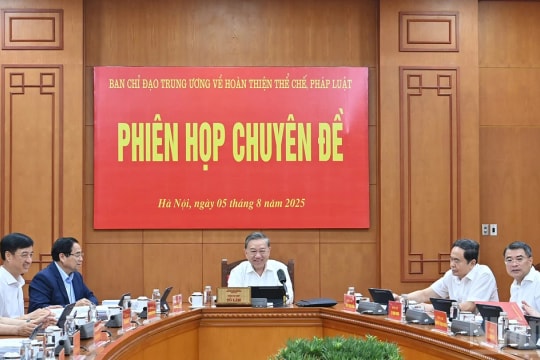
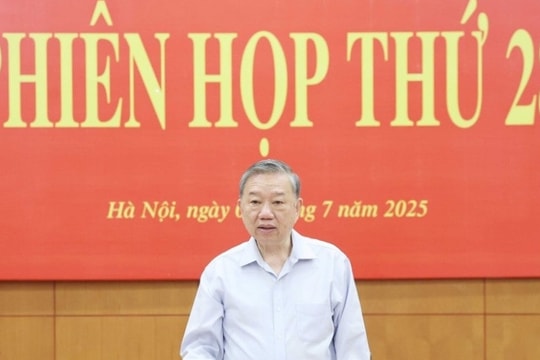
.jpg)
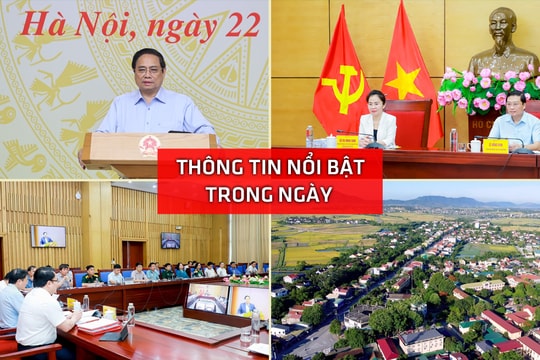
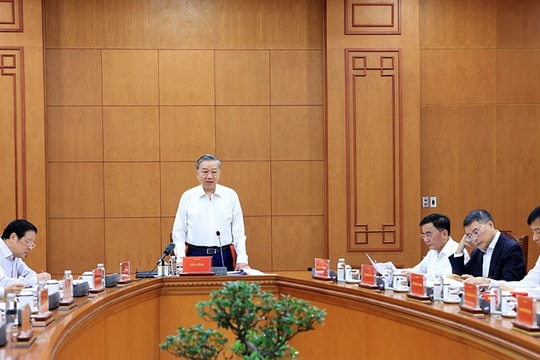
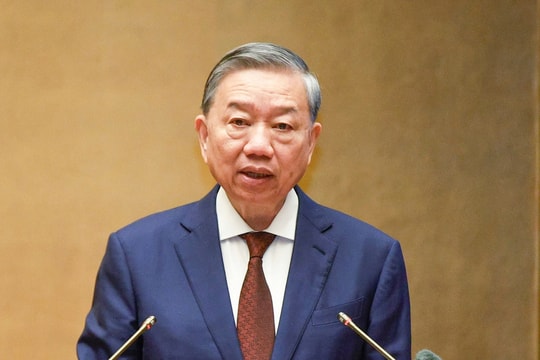
.jpg)
